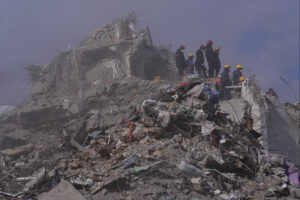In Wake of Assad’s Departure, Israel Occupies More Syrian Territory
Benjamin Netanyahu abandons Israel’s 1974 disengagement agreement with Syria, as Israeli forces take positions inside sovereign Syria. Israeli soldiers walk near armored vehicles parked in the Golan Heights on Dec. 8, 2024. (AP Photo/Matias Delacroix)
Israeli soldiers walk near armored vehicles parked in the Golan Heights on Dec. 8, 2024. (AP Photo/Matias Delacroix)
Israeli Prime Minister Benjamin Netanyahu announced Israel’s dissolution of its commitment to the 1974 forces disengagement agreement with Syria, which ended the 1973 war between the two countries. Netanyahu made his announcement in a televised statement from the occupied Syrian Golan Heights on Sunday.
Netanyahu’s declarations came shortly after Israeli forces breached the de-militarized buffer zone between the Israeli-occupied and the Syrian-held territory in the Golan. Israeli forces invaded and took over several positions inside Syrian sovereign territory, including the summit of Mount Al-Sheikh, with no resistance, according to Israeli reports.
Early on Sunday, the Syrian rebel coalition Hayat Tahrir al-Sham announced the fall of Syrian dictator Bashar al-Assad’s regime. The regime had ruled Syria for more than two decades and was preceded by the regime of Bashar’s father, Hafez al-Assad, since the 1970s. Simultaneously, Syrian opposition forces took over key government buildings in Damascus. Hours before, Assad was reported to have fled the Syrian capital. Russia later confirmed that he had been granted asylum in the country.
Overnight between Saturday and Sunday, Israeli warplanes bombed key targets in and around Damascus, including the capital’s military airport and the Syrian Scientific Research Center.
Israeli forces invaded and took over several positions inside Syrian sovereign territory.
Syria fought Israel in 1948, 1967 and 1973. Hafez Al-Assad took power in Syria in a military coup in 1970, in what was seen as one of the repercussions of Syria’s defeat by Israel in 1967. Under Hafez Al-Assad, Syria participated, along with Egypt, in the October 1973 war against Israel, and liberated part of its occupied territory in the Golan Heights. In 1974, Syria and Israel signed a ceasefire and “forces disengagement” agreement, which created a de-militarized zone between Israeli-occupied and Syrian-held territory.
Assad’s Syria also fought Israel in the Sultan Yacoub battle, during Israel’s invasion of Lebanon in 1982, alongside Palestinian resistance groups, but didn’t participate directly in the rest of the war on Lebanon. Syria sent forces into Lebanon in 1976 as part of a larger Arab coalition to contain the Lebanese civil war.
Throughout the 1990s, Assad used Syria’s military presence in Lebanon to influence Lebanese politics and became the main supporter of the Lebanese resistance during the rise of Hezbollah in the south of Lebanon. Syria represented Hezbollah in indirect negotiations with Israel, through the U.S., during the 1996 Israeli “grapes of wrath” assault on Lebanon, leading to the “April understanding” that stipulated avoiding the targeting of civilians on both sides.
Syria never recognized Israel, although under Hafez al-Assad, it engaged in negotiations with it in the late 1990s aimed at reaching an agreement based on Israel’s return of the Golan Heights in exchange for Syria’s recognition of Israel. Hafez al-Assad’s government insisted on signing peace with Israel only when Israel signed a final peace agreement with Palestinians that would lead to a Palestinian state. Neither of those things ever happened.
Bashar al-Assad came to power after the death of his father in 2000 and continued the same policy in regard to Israel, Hezbollah and the Palestinian question. In 2005, Syria withdrew its forces from Lebanon after widespread protests that erupted following the assassination of Lebanon’s Prime Minister Rafic Hariri. However, it reinforced its influence in Lebanon after the 2006 Israeli war on Lebanon, bolstering Hezbollah’s status as a resistance force in the region.
In 2011, amid the Arab Spring revolutions, protests erupted across Syria against Assad’s regime, which had become notorious in Syria for brutal repression of dissidents and the disappearance and torture of ordinary Syrians critical of the regime. Assad responded with violent repression of protesters, including with live fire, killing scores of Syrians. Protests soon evolved into armed confrontations between regime forces and armed rebels, who were joined by dissident army members. Simultaneously, armed groups made of foreign fighters also began to form, receiving arms and support from regional and foreign countries antagonistic to Assad. The most notorious of these groups was the Al-Nusra Front, which sprang from Syria’s branch of Al-Qaeda. Its leader, Ahmad Al-Sharaa, now known as Abu Mohammad Al-Julani, later dissociated himself from Al-Qaeda and became the leader of the current Syrian rebel force which toppled Assad.
Throughout the Syrian civil war, Assad employed carpet bombing of civilian areas, causing the displacement of hundreds of thousands of Syrians. He has been accused of war crimes by several human rights organizations, which have also accused rebel groups of committing war crimes.
Assad’s regime also played a key role in the Iranian-led military alliance that connected militia groups across Iran, Iraq, Syria and Lebanon.
Syria never recognized Israel, although under Hafez al-Assad, it engaged in negotiations with it in the late 1990s.
After the ISIS takeover of large parts of Iraq, the Iraqi “Popular Mobilization” was formed, which included a coalition of Iraqi militias backed by Iran. The mobilization fought against ISIS and was credited as a key element in its defeat. The coalition, which was later recognized as part of the Iraqi armed forces by the Iraqi state, would join an Iranian-led military alliance geographically connecting Iran, Iraq, Syria and Lebanon, which increased Syria’s strategic importance in the region.
This alliance was strengthened after Iraqi militias, Iranian military advisers and Hezbollah fighters assisted Assad during the Syrian civil war against rebel groups between 2012 and 2018, leading to Assad’s control of large parts of Syria. Israel increased its bombing of Syrian territory, especially Syrian army targets throughout these years, claiming that it was targeting provision routes between Iran and Hezbollah. Syria never responded to Israel’s attacks.
The collapse of the Assad regime represents a major change in the Middle East’s geopolitical map. This change will have important impacts on Israel’s relation to the rest of the region and on the future course of the Palestinian cause. As the new phase of Syria’s history has yet to take form, this impact remains uncertain.
Your support is crucial…With an uncertain future and a new administration casting doubt on press freedoms, the danger is clear: The truth is at risk.
Now is the time to give. Your tax-deductible support allows us to dig deeper, delivering fearless investigative reporting and analysis that exposes what’s really happening — without compromise.
Stand with our courageous journalists. Donate today to protect a free press, uphold democracy and unearth untold stories.









You need to be a supporter to comment.
There are currently no responses to this article.
Be the first to respond.